PhotoVoice is a community-based method of participatory research that uses photography and personal stories to reflect the lives, understanding and actions of community members themselves.
This PhotoVoice project includes reflections from community members who work with San Joaquin Valley organizations working together to advance health and racial equity in the region: Californians for Pesticide Reform; Center on Race, Poverty and the Environment; Centro Binacional Para El Desarrollo Indígena Oaxaqueño; Education and Leadership Foundation; and United Farm Workers Foundation.
The photos and stories in this project reflect the lives of community members and partners of the San Joaquin Valley Health Fund, a collaboration of nearly 100 community organizations and 21 funders fueling a movement to advance health and racial equity across the Valley through community empowerment and policy and systems change. The San Joaquin Valley Health Fund, managed by The Center at Sierra Health Foundation, provided support for this project.
Centro Binacional Para El Desarrollo Indígena Oaxaqueño
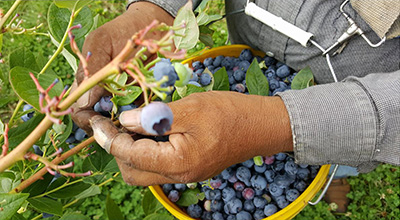
Cornelio | Indigenous of the Triqui Community, Oaxaca, Mexico
I am an immigrant from the state of Oaxaca and I have been working in the agricultural fields of this country for more than twenty years. Because of the type of work I do, I have always been exposed to all types of pesticides. I have heard of these chemicals, but I only work because there is no one to explain the damage they can cause me. Sometimes for wanting to earn a little more money I don’t pay attention to what could be possible symptoms of poisoning such as: watery eyes, headache and an itchy face.
On the other hand, I don’t know about my rights or if there are laws that protect farm workers like me who are exposed to pesticides while they work. Sometimes employers give us training, but not in our indigenous languages to understand it in its entirety. Every day I work hard to support my family, but the ranchers don’t realize the damage they cause to their workers with the use of pesticides.
Cornelio | Indigena de la Comunidad Triqui, Oaxaca, Mexico
Eoy inmigrante del estado de Oaxaca y hace más de veinte años que trabajo en los campos agrícolas de este país. Por el tipo de trabajo que realizo, siempre eh estado expuesto a todo tipo de pesticidas. Eh escuchado de estos químicos, pero solamente me dedico a trabajar porque no hay alguien que me explique los daños que estos me pueden causar. A veces por querer ganar un poco más de dinero no le pongo atención a lo que podrían ser posibles síntomas de envenenamiento como: ojos llorosos, dolor de cabeza y comenzó en la cara.
Por otra parte, no sé sobre mis derechos o si hay leyes que protejan a los trabajadores del campo como yo que están expuestos a los pesticidas mientras trabajan. Algunas veces los empleadores nos dan entrenamientos, pero no en nuestras lenguas indígenas como para entenderlo en su totalidad. Todos los días trabajo duro para mantener a mi familia, pero los rancheros no se dan cuento del daño que causan a sus trabajadores con el uso de pesticidas.
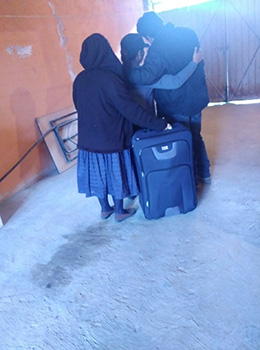
Margarita | Indigenous of the Mixteca Community, Oaxaca, Mexico
I was just a child on the day of that accident that caused my father’s death. Shortly after his death, my relatives separated me from my mother saying it was for my good.
I was only thirteen when I arrived in the United States and despite my young age I had to start working to support myself. I started trampling grapes, melons and fruit packaging. I never had the opportunity to go to school to learn like girls of my age because I had to work to save money to be able to send to my mother and my brothers.
Since arriving in this country I have always considered myself a good person. I have never had problems with the police and have always filed my taxes. I have always looked for ways to cover my needs to not depend on public assistance.
In 2010, I had the opportunity to present my case to immigration in order to obtain my residence. After seven years of waiting, in November 2017 I received the news that my case had been approved. The first thing that went through my mind was that I could finally travel to Mexico and see my mother. Finally, after twenty-four years of that accident and the separation of my family, it was on June 6, 2018 that I could see my mother and my brothers again.
Margarita | Indigena de la comunidad Mixteca, Oaxaca, Mexico
Era tan solo una niña el día de aquel accidente que ocasionó la muerte de mi padre. Al poco tiempo de su muerte, mis familiares me separaron de mi madre diciendo que era por mi bien.
Tan solo tenía trece años cuando llegué a Estados Unidos y a pesar de mi corta edad tuve que empezar a trabajar para poder mantenerme. Empecé piscando uva, melón y en lo empaques de frutas. Nunca tuve la oportunidad de ir a la escuela para aprender como las niñas de mi edad porque tenía que trabajar para ahorrar dinero y poder enviarle a mi mama y mis hermanos.
Desde que llegue este país siempre me he considerado una buena persona. Nunca he tenido problemas con la policía y siempre he declarado mis impuestos. Siempre he buscado la forma de cubrir mis necesidades para no depender de la asistencia pública.
En el 2010, tuve la oportunidad de presentar mi caso ante inmigración para poder obtener mi residencia. Después de siete años de espera, en noviembre del 2017 recibí la noticia de que mi caso había sido aprobado. Lo primero que pasó por mi mente fue que al fin podría viajar a México y ver a mi mamá. Finalmente, después de veinticuatro años de aquel accidente y de la separación de mi familia, fue el 6 de junio de 2018 que pude ver a mi mamá y mis hermanos nuevamente.
Californians for Pesticide Reform
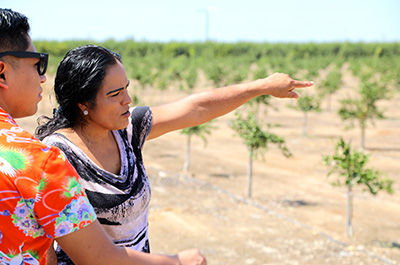
Fidelia Morales | Lindsay, California
The Morales home sits on a patch of parched earth surrounded by orange groves in the small agricultural town of Lindsay, California.
Fidelia and Luis moved here 10 years ago, when their triplets were 10 and their son Matthew was 2. Their youngest, Luis Junior, was born a year later.
The triplets are in college now, but Fidelia still worries about her children – mostly about Junior. Teachers report behavioral problems in the classroom. The 9-year-old is bright and active but has a hard time listening and doing his work.
Fidelia believes pesticide drift is partly to blame.
The mother of five has become an active member of the Coalition Advocating for Pesticide Safety (CAPS) in Tulare County. Fidelia explains, “I became involved in pesticide issues because my children were being exposed, and as a mother, I am worried about their health. And that’s why I have taken action – by going to Sacramento, speaking with the legislators, together with CAPS. Why? Because our voice must be heard and only together can we bring about change.”
“Before I joined CAPS, I always strived to make my family better, healthier, and, well, I found CAPS and I have learned a lot from CAPS. I have felt more sure of myself; I have felt stronger about what I am doing. And I like it. Why? Because I am fighting for a cause that is going to protect my family.”
Fidelia’s filed multiple reports with the local Agricultural Commissioner, who’s found chemicals on her property near the swing set and trampoline where children play. So Fidelia speaks out in media interviews, at hearings held by the California Department of Pesticide Regulation, and at press conferences. Now staffers from the local Agricultural Commissioner go out to her home to supervise almost every nearby application – something that started happening only because of her involvement.
“I believe the best way to help protect the community concerning this pesticide issue is to give them information, because sometimes we don’t know whom to turn to. It’s necessary to share information so people feel supported and don’t feel alone.”
To support the leadership of community members like herself, Fidelia explains,” The support that can be given to the community is the following: first of all, speak Spanish, be bilingual, right? More than anything: Spanish! Why? Because here we speak mostly just Spanish. Secondly, provide group meetings… provide transportation; allow people to feel more at ease, even going to their homes and having the meetings there; invite them to events that might be happening; keep them informed. That would help a great deal. The community would be more informed and in that way there would be more communication and they would get more involved.”
“Since joining CAPS, she’s taken on a different vision of engagement,” says CAPS organizer Angel Garcia. “She’s empowered and not afraid to talk about the use of chemicals around her property.”
Fidelia Morales | Lindsay, California
La casa de la familia Morales se ubica en una parcela de tierra reseca, rodeada de huertas de naranjos en el pequeño pueblo agrícola de Lindsay, California.
Fidelia y Luis se mudaron a este lugar hace 10 años cuando sus trillizos tenían 10 años de edad y su hijo Matthew tenía dos años. El más pequeño, Luis “Junior”, nació un año más tarde.
Los trillizos ya están en la universidad, pero Fidelia aún se preocupa por sus hijos—sobre todo por Junior. Los maestros de la escuela le han informado que el niño tiene problemas de comportamiento en el salón de clases. El tiene nueve años y es muy listo y activo; sin embargo, se le dificulta prestar atención y terminar su trabajo escolar.
Fidelia le echa la culpa, en parte, a la dispersión de pesticidas.
Esta madre de cinco hijos se ha convertido en un miembro activo de la Coalición Abogando por el Uso Seguro de Pesticidas (CAPS, como son sus siglas en inglés), en el Condado de Tulare. Fidelia explica, “Yo me involucré en este tema de los pesticidas porque mis hijos están siendo expuestos, y como madre, estoy preocupada por la salud de ellos. Y es por eso que yo he tomado acción – en ir a Sacramento, en hablar con los legisladores, junto con CAPS. ¿Por qué? Porque nuestra voz tiene que ser escuchada y solamente juntos podemos lograr un cambio.”
“Antes de unirme a CAPS, yo siempre he luchado para que mi familia esté mejor, más saludable y, pues, encontré a CAPS y yo he aprendido mucho de CAPS. Yo me he sentido más segura; me he sentido más fuerte en lo que estoy haciendo. Y, a mí me gusta. ¿Por qué? Porque estoy luchando por una causa que va a proteger a mi familia.”
Ella ha presentado varios informes con el Comisionado su Agricultura local, entidad que encontró sustancias químicas en su propiedad cerca de los columpios y de un trampolín donde los niños juegan. Así que Fidelia alza la voz en entrevistas con los medios de comunicación, en las audiencias públicas realizadas por el Departamento de Regulación de Pesticidas de California, y en las ruedas de prensa. Ahora el personal del Comisionado de Agricultura local esta yendo a su casa a supervisar todas las aplicaciones cercanas – algo que empezó solamente debido a su involucramiento.
“Yo creo que la mejor manera de ayudar a la comunidad en este asunto de los pesticidas para que esten más protegidos es dandoles esta información porque a veces no sabemos a quién acudir. Se necesita dar la información para que ellos sientan apoyo, y no se sientan solos.”
Para apoyar el liderazgo de miembros de la comunidad como ella, Fidelia explica, “el apoyo que se le podría brindar a la comunidad es: número uno, hablar español— ser bilingüe, ¿verdad? Y más que nada español. ¿Porqué? Porque aquí hablamos casi puro español. Segundo, facilitar las reuniones en grupos… facilitarles el transporte, facilitarles que sea más cómodo para ellos, hasta ir a sus casas y hacer allí las reuniones…invitarlos a los eventos que se puedan estar llevando acabo, informarles. Eso les ayudaría muchísimo. La comunidad estuviera más informada y así más se comunicaría, se involucraría más.”
“Desde que se unio a CAPS, ella ha adoptado una visión diferente de compromiso,” dice Ángel García, organizador de CAPS. “Tiene poder y no tiene miedo de hablar sobre el uso de productos químicos alrededor de su propiedad.”
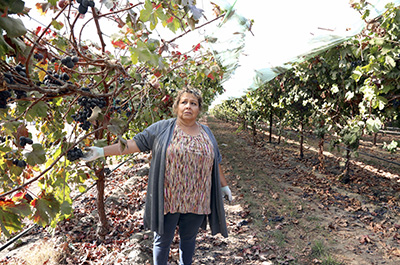
Sandra Garcia | Poplar, California
For the past 40 years, Sandra Garcia has been teaching and advocating to improve the lives of California’s farmworkers. At 16, Sandra and her family moved from Juarez, Mexico, to California’s San Joaquin Valley. Her parents worked in the fields while she stayed home, taking care of her two brothers and five sisters. Two years later, Sandra became a farmworker, too. She married. Eventually had six children. Settled into the small community of Poplar, California, in agriculture-rich Tulare County.
Describing her life as a farmworker she says, “One of the things that affected me was that at that time they sprayed on us a lot. The plane sprayed… not exactly in the same field but sometimes we were eating and they were spraying on the other side and it all came to where we were. I don’t know if that is what hurt me, but I felt that every time that the plane flew over, blood would gush out of my nose. And our food would be full of that dust that they put out, or we really didn’t know what it was… we said that it was like smoke, but…. Well, who knows, right? The only thing was that our heads hurt, we felt dizzy, and well… in any case, it affected us.”
But her life changed most significantly when her mother fell ill. “It’s just a cough,’ the doctors said at first,” Sandra explains. “But that’s how it started for everyone. We began to notice that many of our coworkers were missing work and they said that they were sick with a virus, and then it was allergies, something in the fields, maybe the blossoms, the leaves… We wondered because no one told us what was happening. They never ran any tests or anything.”
The family decided to send her mom to Mexico for testing. “Over there we started to see what was wrong with her. And what it wasn’t. They had said that it was the flu, a cough, that it was a cough. And that is not what she had.” Test results showed pesticide residue in her lungs. Maria de Jesus Garcia Esparza died just months after falling ill. Her death hit the Garcia family hard that Christmas of 1988. Then two more local workers died of cancer. Thirty miles away, a dozen children in McFarland were diagnosed with various types of cancer. The state was called in to investigate, but Cesar Chavez and the United Farm Workers suggested the answer: pesticide contamination of the water.
Sandra organized with Chavez and shared with him the results of her mother’s tests. She began working and learning to become a group leader, a “promotora” who is trained on health and legal matters. A huge first step was to take a pesticide safety training course offered by California Rural Legal Assistance, Inc.
“We didn’t know what pesticides were until the training. Back then, farmers still sprayed with planes or trucks. Workers would be told to pick grapes still dripping with milky white pesticide.”
Today, Sandra collaborates with the Tulare County Coalition Advocating for Pesticide Safety (CAPS). She is also co-founder and co-director of Campesinas Unidas del Valle de San Joaquin (United Women Farmworkers of the San Joaquin Valley) and a founding member of la Asociación de Gente Unida por el Agua, better known as the AGUA coalition, for which she received a 2016 Water Justice award from the Community Water Center.
Sandra Garcia | Poplar, California
Durante los últimos 40 años, Sandra García, ha estado enseñando y abogando por mejoras en la vida de los trabajadores del campo en California. Cuando ella tenía 16 años, la familia García se mudó de Juárez, México, al Valle de San Joaquín de California. Sus padres trabajaban en el campo mientras que ella se quedaba en casa cuidando a sus dos hermanos y cinco hermanas. Dos años más tarde, Sandra se convirtió también en una trabajadora el campo. Se casó y con el tiempo tuvo seis hijos y se estableció en la comunidad de Poplar, California, ubicada en el Condado de Tulare, condado muy rico en agricultura.
Describiendo su vida como trabajadora del campo dice, “Una de las cosas que me afectó a mí fue porque en ese tiempo nos esprayaban mucho. El avión esprayaba, no precisamente en el ‘fil’ de nosotros pero a veces estábamos comiendo y estaban esprayando en otro lado y todo se venía para acá con nosotros. No sé si eso era lo que me hacía daño pero sí yo sentía que cada vez que pasaba el avión se me venía un chorro de sangre de las narices. Y nuestra comida se llenaba de ese polvo que echaban, o no sabíamos… nosotros decíamos que era como humo, pero… Pues, ¿quién sabe, verdad? Nos dolían las cabezas, nos sentíamos mareados y, pues… nos afectaba de todos modos.”
Pero su vida cambió significativamente cuando su madre se enfermó. “‘Es solo una tos,’ dijeron los médicos al principio,” explica Sandra. “Pero así sucedió con todos. Empezamos a ver que muchos de nuestros compañeros faltaban al trabajo porque decían que estaban malos del virus, de allí de la alergia, del campo, tal vez los brotos o las hojas. . . Nos preguntábamos porque nadie nos decía qué estaba pasando. Nunca les hicieron análisis de nada.”
La familia decidió enviar su madre a México por pruebas médicas. “Allá, ya empezamos a ver que era. Y lo que no era. Ellos nos habían dicho que era una gripa, una tos, que era tos. Y no era eso lo que ella tenía.” Los resultados de los análisis mostraron residuos de pesticida en sus pulmones. Sólo meses después de haber caído enferma, María de Jesús García Esparza falleció. Su muerte afectó seriamente a la familia García en esa Navidad de 1988. Luego, otros dos trabajadores locales murieron de cáncer. A treinta millas de distancia, una docena de niños en la ciudad de McFarland fueron diagnosticados con diferentes tipos de cáncer. Se llamó al Estado para que mandaran investigar, pero César Chávez y la Unión de Trabajadores Agrícolas sugirieron la verdadera causa: la contaminación del agua por pesticidas.
Sandra se organizó con Chávez y compartió con él los resultados de los análisis de su madre. Comenzó a trabajar y se entrenó para convertirse en una líder del grupo, una “promotora” que estaba capacitada en temas de salud y de asuntos legales. Un primer paso importante fue tomar un curso de capacitación sobre la seguridad de pesticidas que ofreció la Asistencia Rural y Legal de California, Inc.
“No sabíamos qué eran los pesticidas hasta que hicimos la capacitación,” dijo. “En aquel entonces, los agricultores aún rociaban con avionetas o camiones. A los trabajadores les mandaron a recoger las uvas que todavía estaban empapadas con pesticidas blancos y lechosos.”
Hoy en día, Sandra colabora con la Coalición Abogando por el Uso Seguro de Pesticidas del Condado de Tulare (CAPS, por sus siglas en inglés). También es cofundadora y codirectora de Campesinas Unidas del Valle de San Joaquín (United Women Farmworkers of San Joaquin Valley) y socia fundadora de la Asociación de Gente Unida por el Agua, mejor conocida como la coalición AGUA, por la que ella recibió un premio de Justicia del Agua en 2016, otorgado por el Centro Comunitario del Agua.
Center on Race, Poverty & the Environment
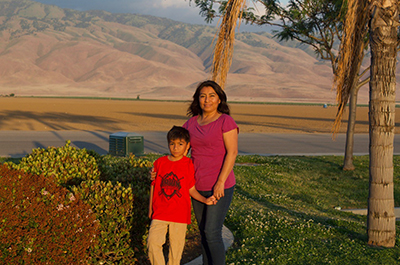
Gabriela Ojeda | Arvin, California
For the years she worked in a mandarin packing house, Gabriela had the strong sense that there was something dangerous and unhealthy about working there. She frequently had upper respiratory issues, as did the other women working around her. Women purchased over the counter allergy and cold medications to deal with the strongly smelling air in the small, cramped sorting rooms. The women sorting the fruit would trade off the job of being in these rooms, knowing how toxic it was. Though the factory owners and operators would claim to workers that it was safe to sort through the fruit, it was clear to her from how sick everyone got in the packing house that it was not. While Gabriela dreamed of growing her family, she feared miscarriages. She and her husband both knew it wouldn’t be possible to have more children while she was still working in the packing house.
Gabriela is now a mother of four children and has been part of her children’s education for years. Gabriela is very involved in her children’s education and schools. She places strong importance on being involved at school. She participates in the PTA, children’s ESL classes, and other monthly activities at the school campuses. She has strived to have the best education for her children and wants them to succeed.
Though she no longer works in a mandarin packing house, she lives across the street from fields that are zoned for agriculture. Her children’s school is also near their home and the fields. During the summer, she works in the fields with her oldest daughter to help her pay for her college expenses. After her time at a packing house and her continued work in the agricultural fields in South Kern, Gabriela still wonders what the long term health effects on her family will be from the exposure to pesticides.
In November 2018, she was part of an interview with The New York Times, where she shared her story of how she suffered working in the mandarin packing house. She is currently working with the Center on Race, Poverty, & Environment and Committee for a Better Arvin to make pesticide policy better at a local and state level. She has gone to hearings in Sacramento to speak on behalf of her community.
Gabriela Ojeda | Arvin, California
Durante los años que trabajó en una empacadora de mandarinas, Gabriela tuvo la fuerte sensación de que había algo peligroso y poco saludable en trabajar allí. Con frecuencia tenía problemas respiratorios superiores, al igual que las otras mujeres que trabajaban a su alrededor. Las mujeres compraban medicamentos sin receta para la alergia y el resfriado para lidiar con el aire fuertemente maloliente en las pequeñas y estrechas salas de clasificación. Las mujeres que clasifican la fruta cambiarían el trabajo de estar en estas habitaciones, sabiendo lo tóxico que era. Aunque los propietarios y operadores de la fábrica afirmaban a los trabajadores que era seguro clasificar la fruta, le quedó claro por lo enferma que estaba todo el mundo en la empacadora que no era así. Mientras Gabriela soñaba con hacer crecer a su familia, temía los abortos espontáneos. Tanto ella como su esposo sabían que no sería posible tener más hijos mientras ella todavía estaba trabajando en la empacadora.
Gabriela ahora es madre de cuatro hijos y ha sido parte de la educación de sus hijos durante años. Gabriela está muy involucrada en el la educación y escuelas de sus hijos. Ella le da mucha importancia a participar en la escuela. Ella participa en la PTA, las clases de ESL de sus niños y otras actividades mensuales en los campus escolares. Ella se ha esforzado por tener la mejor educación para sus hijos y quiere que tengan éxito.
Aunque ya no trabaja en una empacadora de mandarinas, vive al otro lado de la calle de los campos destinados a la agricultura. La escuela de sus hijos también está cerca de su casa y de los campos. Durante el verano, trabaja en el campo con su hija mayor para ayudarla a pagar sus gastos universitarios. Después de su tiempo en una empacadora y su trabajo continuo en los campos agrícolas en el sur de Kern, Gabriela todavía se pregunta cuáles serán los efectos a largo plazo en la salud de su familia por la exposición a los pesticidas.
En noviembre de 2018, formó parte de una entrevista con The New York Times, donde compartió su historia de cómo sufrió trabajando en la empacadora de mandarinas. Actualmente está trabajando con el Centro sobre Raza, Pobreza y Medio Ambiente y el Comité para un Mejor Arvin para mejorar la política de pesticidas a nivel local y estatal. Ella ha ido a audiencias en Sacramento para hablar en nombre de su comunidad.
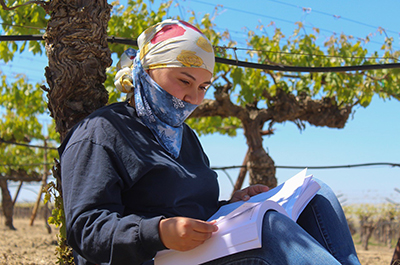
Jasmine Santoyo | Arvin, California
Jasmine began working in the grape and blueberry fields of South Kern at the age of 12. Her parents also work in the grape fields. On her breaks, Jasmine sits against the base of the vines and studies for her classes, which she attends full time. She recently graduated from Bakersfield College with an Associate of Science degree. She starts at Cal State Bakersfield in the fall of 2019 and will major in Agriculture. The fields that her and her family work contribute to the more than $7 billion crop value of Kern County.
Along with other youth leaders in Arvin and other cities in South Kern, Jasmine works to educate communities about pesticide exposure at local schools and nearby homes. Jasmine believes the youth voice is integral in pesticide policy, because the decision of today’s adults will dictate the lives of these youth as they grow. The students that work with Jasmine attend Bakersfield College, Arvin High School, Haven Drive Jr High School, and Mountain View Middle School. Some of these schools are located directly next to agricultural fields, where restricted and non-restricted pesticides are applied on the crops.
Like many youth in the San Joaquin Valley, these youth leaders not only live and go to school near fields, but they also work in these same fields during the summer. In the same way that youth field workers support and protect each other at work by teaching each other how to wear paños to protect their faces and lungs, Jasmine and the other youth also support each other in their advocacy work. Even after a laborious day in the hot sun, the youth leaders from Arvin travel to Shafter every week to learn about AB 617 and how they can bring air monitoring efforts to Arvin. Jasmine and the youth have also traveled to Sacramento to include pesticides as a toxic air contaminant.
She is now working on an air monitoring project with Central California Environmental Justice Network (CCEJN) to demonstrate to the local air district that there is a need for air monitoring in Arvin. Jasmine and other Arvin youth are working together to gather air samples with CCEJN from portable air monitors that they wear on their backpacks, which measure particulate matter (PM 2.5) and ozone levels in Arvin. Jasmine hopes that youth across California that work in the fields not only feel empowered to make choices to improve their own lives, but also to support their fellow youth in building safer, healthier communities for the future.
Jasmine Santoyo | Arvin, California
Jasmine comenzó a trabajar en los campos de uvas y arándanos del sur de Kern a la edad de 12 años. Sus padres también trabajan en los campos de uvas. En sus descansos, Jasmine se sienta apoyandose en la base de las viñas y estudia para sus clases, a las que asiste tiempo completo. Recientemente se graduó de Bakersfield College con un título de Asociado en Ciencias. Ella comienza en Cal State Bakersfield en el otoño de 2019 y se especializará en agricultura. Los campos en los que ella y su familia trabajan contribuyen al valor de la cosecha de más de $ 7 mil millones del condado de Kern.
Junto con otros líderes juveniles en Arvin y otras ciudades en el sur de Kern, Jasmine trabaja para educar a las comunidades sobre la exposición a los pesticidas en las escuelas locales y los hogares cercanos. Jasmine cree que la voz de los jóvenes es integral en la política de pesticidas, porque la decisión de los adultos de hoy dictará las vidas de estos jóvenes a medida que crecen. Los estudiantes que trabajan con Jasmine asisten a Bakersfield College, Arvin High School, Haven Drive Jr High School y Mountain View Middle School. Algunas de estas escuelas están ubicadas directamente al lado de campos agrícolas, donde pesticidas restringidas y no restringidas se aplican en los cultivos.
Como muchos jóvenes en el Valle de San Joaquín, estos líderes juveniles no solo viven y van a la escuela cerca de los campos, sino que también trabajan en estos mismos campos durante el verano. De la misma manera que los jóvenes trabajadores de campo se apoyan y protegen en el trabajo enseñándose mutuamente a usar paños para protegerse la cara y los pulmones, Jasmine y los otros jóvenes también se apoyan mutuamente en su labor de abogacía. Incluso después de un día laborioso bajo el sol ardiente, los líderes juveniles de Arvin viajan a Shafter todas las semanas para aprender sobre AB 617 y cómo pueden traer los esfuerzos de monitoreo del aire a Arvin. Jasmine y los jóvenes también viajaron a Sacramento para incluir pesticidas como contaminantes tóxicos del aire.
Ella ahora está trabajando en un proyecto de monitoreo del aire con Central California Environmental Justice Network (CCEJN) para demostrar al distrito aéreo local que hay una necesidad de monitoreo del aire en Arvin. Jasmine y otros jóvenes de Arvin están trabajando juntos para recolectar muestras de aire con CCEJN de monitores de aire portátiles que usan en sus mochilas, que miden las partículas (PM 2.5) y los niveles de ozono en Arvin. Jasmine espera que los jóvenes de California que trabajan en los campos no solo se sientan capacitados para tomar decisiones para mejorar sus propias vidas, sino también para apoyar a sus compañeros jóvenes en la construcción de comunidades más seguras y saludables para el futuro.
Education and Leadership Foundation
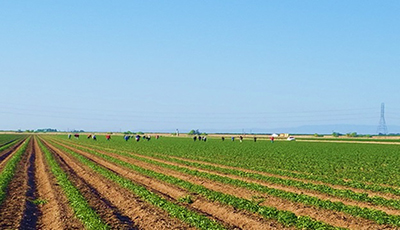
Elia Isadoro
The effort of our farmworkers not only provides food to their own tables, but also to the tables of the entire world that depend on crops from the Central Valley. The need to work and to provide food to their tables makes farmworkers forget about their health status, thus leading to exposure of pesticides and direct sunlight that can harm them in various forms. This is a common scenario that is evident throughout the Central Valley despite the day of the year, holiday, birthday, or any day of the week. It is a common picture that can be observed in any of the 365 days of the year without consideration of the intense heat, severe rains, or cold weather that might be present that day.
Elia Isadoro
El esfuerzo de nuestros trabajadores del campo no solo proporciona alimentos a sus propias mesas, sino también a las mesas de todo el mundo que dependen de los cultivos del Valle Central. La necesidad de trabajar y proporcionar alimentos a sus mesas hace que los trabajadores del campo se olviden de su estado de salud, lo que conduce a la exposición de pesticidas y a la luz solar directa que puede dañarlos en varias formas. Este es un escenario común que es evidente en todo el Valle Central a pesar del día del año, feriado, cumpleaños o cualquier día de la semana. Es una imagen común que se puede observar en cualquiera de los 365 días del año sin tener en cuenta el calor intenso, las lluvias intensas o el clima frío que podría estar presente ese día.
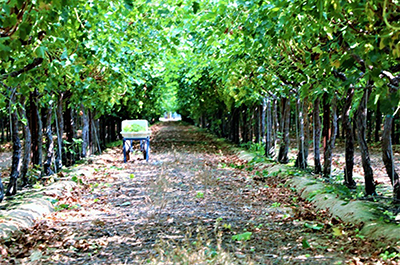
Jasmine Santoyo | Arvin, California
Bearing the cross
Working in the field is not easy, but one for the family is willing to do whatever. The life of farmers is an endless race. Since one gets up at 3-4 in the morning to prepare “lunch” until one returns home with the family. The hardest thing for one as a parent is not being able to spend more time with our children. That is the sacrifice that each father and mother makes because we know that the greatest reward for our effort, sweat and tears is to give our children the opportunity to go to college and receive a better education that gives them a better future. For our children, we don’t mind walking thousands in the grape fields with the wheelbarrow so my children can study.
Jasmine Santoyo | Arvin, California
Con la cruz a cuestas
El trabajo en el campo no es fácil, pero uno por la familia está dispuesto a hacer lo que sea. La vida del campesino es una carrera interminable. Desde que uno se levanta a las 3-4 de la mañana a preparar “el lonche” hasta que regresa uno a casa con su familia. Lo más difícil para uno como padre es no poder pasar más tiempo con nuestros hijos. Eso es el sacrificio que cada padre y madre de familia hace porque sabemos que la mayor recompensa a nuestro esfuerzo, sudor y lágrimas es darles la oportunidad a nuestros hijos de ir a la universidad y recibir una mejor educación que les brinde un mejor futuro. Por nuestros hijos no nos importa caminar millares en los campos de uva con la carretilla mientras mis hijos puedan estudiar.
UFW Foundation

Judith
“Family Separation”
A border is meant to separate certain areas, not people. However, nowadays family separations are occurring more frequently. It is morally wrong to tear families apart. Especially when the parents have to leave their children behind. This isn’t what America represents. Parents only come to the United States with their families to provide a better future for their kids. We should be reuniting families, not tearing them apart.
Judith
“Separación familiar”
Una frontera está destinada a separar ciertas áreas, no personas. Sin embargo, hoy en día las separaciones familiares se producen con mayor frecuencia. Es moralmente incorrecto separar familias. Especialmente cuando los padres tienen que dejar su niños detrás. Esto no es lo que Estados Unidos representa. Los padres solo vienen a los Estados Unidos con sus familias para proporcionar un mejor futuro para sus hijos. Deberíamos reunir familias, no destrozarlas.
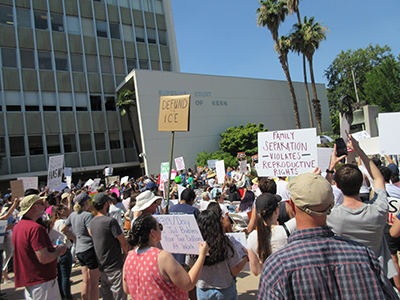
Sharon Uyeoka
This is where we step in and we become their voices. We take to the streets carrying our signs, uniting together and we demand justice be served.
I have taken many different pictures in my time but none have disturbed me this much, to the point where my heart is breaking
Sharon Uyeoka
“Denme sus cansados, sus pobres, sus masas amontonadas anhelando respirar en libertad.”
Aquí es donde entramos y nos convertimos en sus voces. Salimos a las calles llevando nuestros letreros, uniéndonos y exigimos que se haga justicia.
He tomado muchas fotos diferentes en mi tiempo, pero ninguna me ha perturbado tanto, hasta el punto de que mi corazón se está rompiendo.
